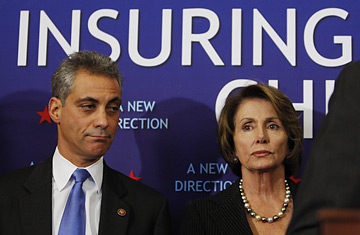
House Speaker Nancy Pelosi of Calif., right, stands with Rep. Rahm Emanuel, D-Ill., during a press conference on Capitol Hill in Washington.
The G.O.P. has had a rough month. But if Republicans think things will improve now that House Democrats have failed in their vote Thursday to override President Bush's veto of a $35 billion expansion of the popular State Children's Health Insurance Program (S-CHIP), they are in for a rude awakening.
Liberal interest groups have had a field day running brutal TV ads that take a page from adopt-a-starving-child commercials: adorable children stare wide-eyed into the camera as a voice-over criticizes the President and members of his party for blocking the S-CHIP bill ("George Bush just vetoed Abby" intones the narrator). And sick kids, it turns out, are just the opening salvo in a wider appropriations battle. Democrats have lined up an array of heartwarming — and expensive — spending bills that will be potentially embarrassing for Bush to veto.
Bush's veto was upheld by a vote of 273-156, 13 votes short of the two-thirds majority needed. After the vote, House Speaker Nancy Pelosi swore to resend a bill that includes an identical expansion back to Bush within the next two weeks. She refused to say if the measure would be completely identical, "as long as the bottom line that 10 million children are covered, that is not negotiable," Pelosi said. "This isn't an issue any more, it's a value in our country from which the President appears to be isolated," she told reporters in a room just off the House floor. "We will be happy to sit down and meet the President any time he's ready and we hope he's ready soon."
The President has made no secret that he intended to pick a fight with Dems on spending, threatening to block nine of the 12 annual spending bills. It's all part of his campaign to reclaim the mantle of fiscal conservatism that plays well with his increasingly dissatisfied base. The Democrats are countering by front-loading the legislative calendar with spending bills on such sentimental topics as education and veterans that will make Bush look like the Grinch for even daring to veto. They next plan to hammer him on a bipartisan water resources bill that — again — Bush says costs too much money. "The President's vetoes are not consistent with the judgment of the American public,"said House Majority Leader Steny Hoyer. "We believe [the G.O.P.] will pay a price for that."
One price, Democrats are hoping, is that Republican members will run out of steam after children's health care and water resources and not have much fight left for the 2008 spending bills. But don't hold your breath, House Minority Leader John Boehner replied. "Republicans have made fiscal responsibility a top priority, and we will sustain any presidential veto over wasteful and excessive spending,"Boehner said. "House Democrats have intentionally designed a strategy to ensure more pork and more wasteful spending, not less. That's not what the American people want, and Republicans will stand on principle to ensure families aren't stuck with the tab for the Democrats' spending spree."
As with so many disputes in Washington, the actual difference is dollar terms is fairly small: Bush supports a $25 billion expansion of SCHIP, while Democrats insist on a $35 billion increase. And after the beating the G.O.P. has taken in the last month, on Wednesday the President sounded downright conciliatory on the program. "I made clear that if putting poor children first requires more than the 20% increase in funding I proposed, we'll work with Congress to find the money we need," Bush said in his opening remarks at a White House press conference. "I'm confident we can work out our differences and reauthorize SCHIP."
Bush may simply be recognizing reality: Congressional sources on both sides of the aisle expect a compromise to eventually pass that will include the $35 billion that Democrats have demanded. And the water measure — which gives $7 billion to restore Louisiana wetlands and reorganizes the embattled U.S. Army Corps of Engineers — has so much support that Congress is likely to hand Bush the first veto override of his presidency.
On appropriations, the difference between what Bush and Congress are pushing is also relatively minor. House and Senate Democrats are asking for $22 billion more than what Bush requested in his 2008 fiscal budget, which amounts to less than 2% of the overall annual budget. Bush spent part of his news conference trying to make the argument that his veto threat is based on principle, not partisan politics, by stressing that he made similar warnings to G.O.P. leaders when they controlled Congress. "You bet I'm going to put veto threats out,"Bush said. "Of course, I want to remind you, I put a lot of veto threats out when the Republicans were in control of Congress. I said, 'Now, if you overspend I'm going to veto your bills,' and they listened, and we worked together. Whether or not that's the case, we'll find out."
Despite those threats, Bush ultimately never once vetoed a Republican spending bill even though the vast majority included funding levels far larger than he requested. "There is, of course, an irony about a President who let through all kinds of appropriations that were far above his proposals through, suddenly itching to use the budget veto,"said Clyde Wilcox, a government professor at Georgetown University.
While Democrats fully intend to capture every embarrassing vote in an array of 30-second TV spots ahead of the 2008 elections, they insist that none of the legislation they are passing — much of it with bipartisan support — is simply symbolic gotcha bills meant to paint Bush into a corner and score political points. As one senior Senate aide remarked: "This is not Terry Schiavo, flag burning and gay marriage." That may or may not be true, but the mud that flies should be just as ugly.
